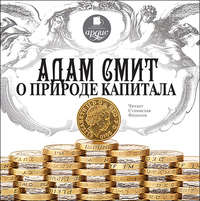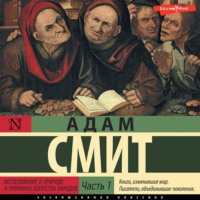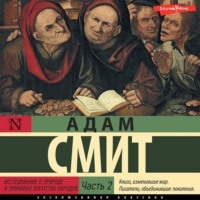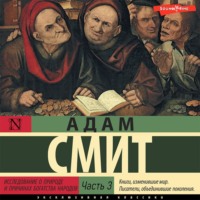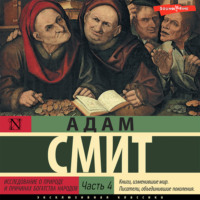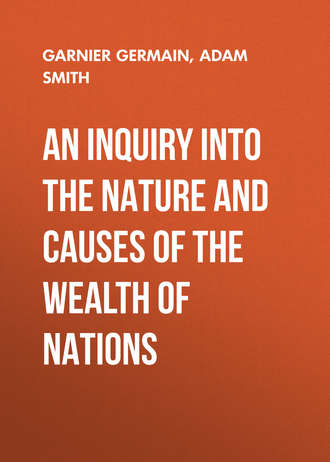 полная версия
полная версияAn Inquiry Into the Nature and Causes of the Wealth of Nations
The difference of natural talents in different men, is, in reality, much less than we are aware of; and the very different genius which appears to distinguish men of different professions, when grown up to maturity, is not upon many occasions so much the cause, as the effect of the division of labour. The difference between the most dissimilar characters, between a philosopher and a common street porter, for example, seems to arise not so much from nature, as from habit, custom, and education. When they came into the world, and for the first six or eight years of their existence, they were, perhaps, very much alike, and neither their parents nor playfellows could perceive any remarkable difference. About that age, or soon after, they come to be employed in very different occupations. The difference of talents comes then to be taken notice of, and widens by degrees, till at last the vanity of the philosopher is willing to acknowledge scarce any resemblance. But without the disposition to truck, barter, and exchange, every man must have procured to himself every necessary and conveniency of life which he wanted. All must have had the same duties to perform, and the same work to do, and there could have been no such difference of employment as could alone give occasion to any great difference of talents.
As it is this disposition which forms that difference of talents, so remarkable among men of different professions, so it is this same disposition which renders that difference useful. Many tribes of animals, acknowledged to be all of the same species, derive from nature a much more remarkable distinction of genius, than what, antecedent to custom and education, appears to take place among men. By nature a philosopher is not in genius and disposition half so different from a street porter, as a mastiff is from a grey-hound, or a grey-hound from a spaniel, or this last from a shepherd's dog. Those different tribes of animals, however, though all of the same species, are of scarce any use to one another. The strength of the mastiff is not in the least supported either by the swiftness of the grey-hound, or by the sagacity of the spaniel, or by the docility of the shepherd's dog. The effects of those different geniuses and talents, for want of the power or disposition to barter and exchange, cannot be brought into a common stock, and do not in the least contribute to the better accommodation and conveniency of the species. Each animal is still obliged to support and defend itself, separately and independently, and derives no sort of advantage from that variety of talents with which nature has distinguished its fellows. Among men, on the contrary, the most dissimilar geniuses are of use to one another; the different produces of their respective talents, by the general disposition to truck, barter, and exchange, being brought, as it were, into a common stock, where every man may purchase whatever part of the produce of other men's talents he has occasion for.
CHAP. III.
THAT THE DIVISION OF LABOUR IS LIMITED BY THE EXTENT OF THE MARKET
As it is the power of exchanging that gives occasion to the division of labour, so the extent of this division must always be limited by the extent of that power, or, in other words, by the extent of the market. When the market is very small, no person can have any encouragement to dedicate himself entirely to one employment, for want of the power to exchange all that surplus part of the produce of his own labour, which is over and above his own consumption, for such parts of the produce of other men's labour as he has occasion for.
There are some sorts of industry, even of the lowest kind, which can be carried on nowhere but in a great town. A porter, for example, can find employment and subsistence in no other place. A village is by much too narrow a sphere for him; even an ordinary market-town is scarce large enough to afford him constant occupation. In the lone houses and very small villages which are scattered about in so desert a country as the highlands of Scotland, every farmer must be butcher, baker, and brewer, for his own family. In such situations we can scarce expect to find even a smith, a carpenter, or a mason, within less than twenty miles of another of the same trade. The scattered families that live at eight or ten miles distance from the nearest of them, must learn to perform themselves a great number of little pieces of work, for which, in more populous countries, they would call in the assistance of these workmen. Country workmen are almost everywhere obliged to apply themselves to all the different branches of industry that have so much affinity to one another as to be employed about the same sort of materials. A country carpenter deals in every sort of work that is made of wood; a country smith in every sort of work that is made of iron. The former is not only a carpenter, but a joiner, a cabinet-maker, and even a carver in wood, as well as a wheel-wright, a plough-wright, a cart and waggon-maker. The employments of the latter are still more various. It is impossible there should be such a trade as even that of a nailer in the remote and inland parts of the highlands of Scotland. Such a workman at the rate of a thousand nails a-day, and three hundred working days in the year, will make three hundred thousand nails in the year. But in such a situation it would be impossible to dispose of one thousand, that is, of one day's work in the year.
As by means of water-carriage, a more extensive market is opened to every sort of industry than what land-carriage alone can afford it, so it is upon the sea-coast, and along the banks of navigable rivers, that industry of every kind naturally begins to subdivide and improve itself, and it is frequently not till a long time after that those improvements extend themselves to the inland parts of the country. A broad-wheeled waggon, attended by two men, and drawn by eight horses, in about six weeks time, carries and brings back between London and Edinburgh near four ton weight of goods. In about the same time a ship navigated by six or eight men, and sailing between the ports of London and Leith, frequently carries and brings back two hundred ton weight of goods. Six or eight men, therefore, by the help of water-carriage, can carry and bring back, in the same time, the same quantity of goods between London and Edinburgh as fifty broad-wheeled waggons, attended by a hundred men, and drawn by four hundred horses. Upon two hundred tons of goods, therefore, carried by the cheapest land-carriage from London to Edinburgh, there must be charged the maintenance of a hundred men for three weeks, and both the maintenance and what is nearly equal to maintenance the wear and tear of four hundred horses, as well as of fifty great waggons. Whereas, upon the same quantity of goods carried by water, there is to be charged only the maintenance of six or eight men, and the wear and tear of a ship of two hundred tons burthen, together with the value of the superior risk, or the difference of the insurance between land and water-carriage. Were there no other communication between those two places, therefore, but by land-carriage, as no goods could be transported from the one to other, except such whose price was very considerable in proportion to their weight, they could carry on but a small part of that commerce which at present subsists between them, and consequently could give but a small part of that encouragement which they at present mutually afford to each other's industry. There could be little or no commerce of any kind between the distant parts of the world. What goods could bear the expense of land-carriage between London and Calcutta? Or if there were any so precious as to be able to support this expense, with what safety could they be transported through the territories of so many barbarous nations? Those two cities, however, at present carry on a very considerable commerce with each other, and by mutually affording a market, give a good deal of encouragement to each other's industry.
Since such, therefore, are the advantages of water-carriage, it is natural that the first improvements of art and industry should be made where this conveniency opens the whole world for a market to the produce of every sort of labour, and that they should always be much later in extending themselves into the inland parts of the country. The inland parts of the country can for a long time have no other market for the greater part of their goods, but the country which lies round about them, and separates them from the sea-coast, and the great navigable rivers. The extent of the market, therefore, must for a long time be in proportion to the riches and populousness of that country, and consequently their improvement must always be posterior to the improvement of that country. In our North American colonies, the plantations have constantly followed either the sea-coast or the banks of the navigable rivers, and have scarce anywhere extended themselves to any considerable distance from both.
The nations that, according to the best authenticated history, appear to have been first civilized, were those that dwelt round the coast of the Mediterranean sea. That sea, by far the greatest inlet that is known in the world, having no tides, nor consequently any waves, except such as are caused by the wind only, was, by the smoothness of its surface, as well as by the multitude of its islands, and the proximity of its neighbouring shores, extremely favourable to the infant navigation of the world; when, from their ignorance of the compass, men were afraid to quit the view of the coast, and from the imperfection of the art of ship-building, to abandon themselves to the boisterous waves of the ocean. To pass beyond the pillars of Hercules, that is, to sail out of the straits of Gibraltar, was, in the ancient world, long considered as a most wonderful and dangerous exploit of navigation. It was late before even the Phœnicians and Carthaginians, the most skilful navigators and ship-builders of those old times, attempted it; and they were, for a long time, the only nations that did attempt it.
Of all the countries on the coast of the Mediterranean sea, Egypt seems to have been the first in which either agriculture or manufactures were cultivated and improved to any considerable degree. Upper Egypt extends itself nowhere above a few miles from the Nile; and in Lower Egypt, that great river breaks itself into many different canals, which, with the assistance of a little art, seem to have afforded a communication by water-carriage, not only between all the great towns, but between all the considerable villages, and even to many farm-houses in the country, nearly in the same manner as the Rhine and the Maese do in Holland at present. The extent and easiness of this inland navigation was probably one of the principal causes of the early improvement of Egypt.
The improvements in agriculture and manufactures seem likewise to have been of very great antiquity in the provinces of Bengal in the East Indies, and in some of the eastern provinces of China, though the great extent of this antiquity is not authenticated by any histories of whose authority we, in this part of the world, are well assured. In Bengal, the Ganges, and several other great rivers, form a great number of navigable canals, in the same manner as the Nile does in Egypt. In the eastern provinces of China, too, several great rivers form, by their different branches, a multitude of canals, and, by communicating with one another, afford an inland navigation much more extensive than that either of the Nile or the Ganges, or, perhaps, than both of them put together. It is remarkable, that neither the ancient Egyptians, nor the Indians, nor the Chinese, encouraged foreign commerce, but seem all to have derived their great opulence from this inland navigation.
All the inland parts of Africa, and all that part of Asia which lies any considerable way north of the Euxine and Caspian seas, the ancient Scythia, the modern Tartary and Siberia, seem, in all ages of the world, to have been in the same barbarous and uncivilized state in which we find them at present. The sea of Tartary is the frozen ocean, which admits of no navigation; and though some of the greatest rivers in the world run through that country, they are at too great a distance from one another to carry commerce and communication through the greater part of it. There are in Africa none of those great inlets, such as the Baltic and Adriatic seas in Europe, the Mediterranean and Euxine seas in both Europe and Asia, and the gulfs of Arabia, Persia, India, Bengal, and Siam, in Asia, to carry maritime commerce into the interior parts of that great continent; and the great rivers of Africa are at too great a distance from one another to give occasion to any considerable inland navigation. The commerce, besides, which any nation can carry on by means of a river which does not break itself into any great number of branches or canals, and which runs into another territory before it reaches the sea, can never be very considerable, because it is always in the power of the nations who possess that other territory to obstruct the communication between the upper country and the sea. The navigation of the Danube is of very little use to the different states of Bavaria, Austria, and Hungary, in comparison of what it would be, if any of them possessed the whole of its course, till it falls into the Black sea.
CHAP. IV.
OF THE ORIGIN AND USE OF MONEY
When the division of labor has been once thoroughly established, it is but a very small part of a man's wants which the produce of his own labour can supply. He supplies the far greater part of them by exchanging that surplus part of the produce of his own labour, which is over and above his own consumption, for such parts of the produce of other men's labour as he has occasion for. Every man thus lives by exchanging, or becomes, in some measure, a merchant, and the society itself grows to be what is properly a commercial society.
But when the division of labour first began to take place, this power of exchanging must frequently have been very much clogged and embarrassed in in operations. One man, we shall suppose, has more of a certain commodity than he himself has occasion for, while another has less. The former, consequently, would be glad to dispose of, and the latter to purchase, a part of this superfluity. But if this latter should chance to have nothing that the former stands in need of, no exchange can be made between them. The butcher has more meat in his shop than he himself can consume, and the brewer and the baker would each of them be willing to purchase a part of it. But they have nothing to offer in exchange, except the different productions of their respective trades, and the butcher is already provided with all the bread and beer which he has immediate occasion for. No exchange can, in this case, be made between them. He cannot be their merchant, nor they his customers; and they are all of them thus mutually less serviceable to one another. In order to avoid the inconveniency of such situations, every prudent man in every period of society, after the first establishment of the division of labour, must naturally have endeavoured to manage his affairs in such a manner, as to have at all times by him, besides the peculiar produce of his own industry, a certain quantity of some one commodity or other, such as he imagined few people would be likely to refuse in exchange for the produce of their industry. Many different commodities, it is probable, were successively both thought of and employed for this purpose. In the rude ages of society, cattle are said to have been the common instrument of commerce; and, though they must have been a most inconvenient one, yet, in old times, we find things were frequently valued according to the number of cattle which had been given in exchange for them. The armour of Diomede, says Homer, cost only nine oxen; but that of Glaucus cost a hundred oxen. Salt is said to be the common instrument of commerce and exchanges in Abyssinia; a species of shells in some parts of the coast of India; dried cod at Newfoundland; tobacco in Virginia; sugar in some of our West India colonies; hides or dressed leather in some other countries; and there is at this day a village in Scotland, where it is not uncommon, I am told, for a workman to carry nails instead of money to the baker's shop or the ale-house.
In all countries, however, men seem at last to have been determined by irresistible reasons to give the preference, for this employment, to metals above every other commodity. Metals can not only be kept with as little loss as any other commodity, scarce any thing being less perishable than they are, but they can likewise, without any loss, be divided into any number of parts, as by fusion those parts can easily be re-united again; a quality which no other equally durable commodities possess, and which, more than any other quality, renders them fit to be the instruments of commerce and circulation. The man who wanted to buy salt, for example, and had nothing but cattle to give in exchange for it, must have been obliged to buy salt to the value of a whole ox, or a whole sheep, at a time. He could seldom buy less than this, because what he was to give for it could seldom be divided without loss; and if he had a mind to buy more, he must, for the same reasons, have been obliged to buy double or triple the quantity, the value, to wit, of two or three oxen, or of two or three sheep. If, on the contrary, instead of sheep or oxen, he had metals to give in exchange for it, he could easily proportion the quantity of the metal to the precise quantity of the commodity which he had immediate occasion for.
Different metals have been made use of by different nations for this purpose. Iron was the common instrument of commerce among the ancient Spartans, copper among the ancient Romans, and gold and silver among all rich and commercial nations.
Those metals seem originally to have been made use of for this purpose in rude bars, without any stamp or coinage. Thus we are told by Pliny6, upon the authority of Timæus, an ancient historian, that, till the time of Servius Tullius, the Romans had no coined money, but made use of unstamped bars of copper, to purchase whatever they had occasion for. These rude bars, therefore, performed at this time the function of money.
The use of metals in this rude state was attended with two very considerable inconveniences; first, with the trouble of weighing, and secondly, with that of assaying them. In the precious metals, where a small difference in the quantity makes a great difference in the value, even the business of weighing, with proper exactness, requires at least very accurate weights and scales. The weighing of gold, in particular, is an operation of some nicety. In the coarser metals, indeed, where a small error would be of little consequence, less accuracy would, no doubt, be necessary. Yet we should find it excessively troublesome if every time a poor man had occasion either to buy or sell a farthing's worth of goods, he was obliged to weigh the farthing. The operation of assaying is still more difficult, still more tedious; and, unless part of the metal is fairly melted in the crucible, with proper dissolvents, any conclusion that can be drawn from it is extremely uncertain. Before the institution of coined money, however, unless they went through this tedious and difficult operation, people must always have been liable to the grossest frauds and impositions; and instead of a pound weight of pure silver, or pure copper, might receive, in exchange for their goods, an adulterated composition of the coarsest and cheapest materials, which had, however, in their outward appearance, been made to resemble these metals. To prevent such abuses, to facilitate exchanges, and thereby to encourage all sorts of industry and commerce, it has been found necessary, in all countries that have made any considerable advances towards improvement, to affix a public stamp upon certain quantities of such particular metals, as were in those countries commonly made use of to purchase goods. Hence the origin of coined money, and of those public offices called mints; institutions exactly of the same nature with these of the aulnagers and stamp-masters of woollen and linen cloth. All of them are equally meant to ascertain, by means of a public stamp, the quantity and uniform goodness of those different commodities when brought to market.
The first public stamps of this kind that were affixed to the current metals, seem in many cases to have been intended to ascertain, what it was both most difficult and most important to ascertain, the goodness or fineness of the metal, and to have resembled the sterling mark which is at present affixed to plate and bars of silver, or the Spanish mark which is sometimes affixed to ingots of gold, and which, being struck only upon one side of the piece, and not covering the whole surface, ascertains the fineness, but not the weight of the metal. Abraham weighs to Ephron the four hundred shekels of silver which he had agreed to pay for the field of Machpelah. They are said, however, to be the current money of the merchant, and yet are received by weight, and not by tale, in the same manner as ingots of gold and bars of silver are at present. The revenues of the ancient Saxon kings of England are said to have been paid, not in money, but in kind, that is, in victuals and provisions of all sorts. William the Conqueror introduced the custom of paying them in money. This money, however, was for a long time, received at the exchequer, by weight, and not by tale.
The inconveniency and difficulty of weighing those metals with exactness, gave occasion to the institution of coins, of which the stamp, covering entirely both sides of the piece, and sometimes the edges too, was supposed to ascertain not only the fineness, but the weight of the metal. Such coins, therefore, were received by tale, as at present, without the trouble of weighing.
The denominations of those coins seem originally to have expressed the weight or quantity of metal contained in them. In the time of Servius Tullius, who first coined money at Rome, the Roman as or pondo contained a Roman pound of good copper. It was divided, in the same manner as our Troyes pound, into twelve ounces, each of which contained a real ounce of good copper. The English pound sterling, in the time of Edward I. contained a pound, Tower weight, of silver of a known fineness. The Tower pound seems to have been something more than the Roman pound, and something less than the Troyes pound. This last was not introduced into the mint of England till the 18th of Henry the VIII. The French livre contained, in the time of Charlemagne, a pound, Troyes weight, of silver of a known fineness. The fair of Troyes in Champaign was at that time frequented by all the nations of Europe, and the weights and measures of so famous a market were generally know and esteemed. The Scots money pound contained, from the time of Alexander the First to that of Robert Bruce, a pound of silver of the same weight and fineness with the English pound sterling. English, French, and Scots pennies, too, contained all of them originally a real penny-weight of silver, the twentieth part of an ounce, and the two hundred-and-fortieth part of a pound. The shilling, too, seems originally to have been the denomination of a weight. When wheat is at twelve shillings the quarter, says an ancient statute of Henry III. then wastel bread of a farthing shall weigh eleven shillings and fourpence. The proportion, however, between the shilling, and either the penny on the one hand, or the pound on the other, seems not to have been so constant and uniform as that between the penny and the pound. During the first race of the kings of France, the French sou or shilling appears upon different occasions to have contained five, twelve, twenty, and forty pennies. Among the ancient Saxons, a shilling appears at one time to have contained only five pennies, and it is not improbable that it may have been as variable among them as among their neighbours, the ancient Franks. From the time of Charlemagne among the French, and from that of William the Conqueror among the English, the proportion between the pound, the shilling, and the penny, seems to have been uniformly the same as at present, though the value of each has been very different; for in every country of the world, I believe, the avarice and injustice of princes and sovereign states, abusing the confidence of their subjects, have by degrees diminished the real quantity of metal, which had been originally contained in their coins. The Roman as, in the latter ages of the republic, was reduced to the twenty-fourth part of its original value, and, instead of weighing a pound, came to weigh only half an ounce. The English pound and penny contain at present about a third only; the Scots pound and penny about a thirty-sixth; and the French pound and penny about a sixty-sixth part of their original value. By means of those operations, the princes and sovereign states which performed them were enabled, in appearance, to pay their debts and fulfil their engagements with a smaller quantity of silver than would otherwise have been requisite. It was indeed in appearance only; for their creditors were really defrauded of a part of what was due to them. All other debtors in the state were allowed the same privilege, and might pay with the same nominal sum of the new and debased coin whatever they had borrowed in the old. Such operations, therefore, have always proved favourable to the debtor, and ruinous to the creditor, and have sometimes produced a greater and more universal revolution in the fortunes of private persons, than could have been occasioned by a very great public calamity.


